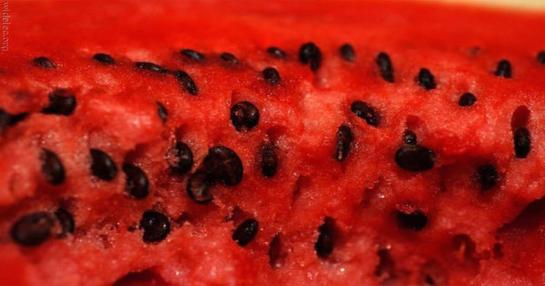 Watermelon: Symbolizing the Supposed Simplicity of Slaves
Watermelon: Symbolizing the Supposed Simplicity of Slaves
Watermelon seeds,
are good sources of magnesium vital for normal heart functioning, maintenance of normal blood pressure, supporting metabolic process and protein synthesis. It is also beneficial in the treatment of cardiovascular diseases and hypertension besides controlling blood pressure and diabetes.Roasted watermelon seeds are served as a snack or used to garnish salads. In Nigeria they are used in certain soups. Watermelon seed oil is extracted from these seeds which is beneficial for your hair and skin. To say the least, watermelon seeds are edible and can be a healthy option.
watermelon seeds
Watermelon seed tea is considered to be a natural diuretic helpful for kidney cleansing.
Watermelon
Food historians believe that African slaves helped introduce the watermelon, now the most consumed melon in the US. The fruit eventually became a major symbol in the iconography of racism in the United States through the “watermelon stereotype”. In various images, the fruit was used to paint African Americans as a simple-minded people who were happy when provided watermelon and a little rest.
Watermelon seeds can be baked with salt for a protein-rich and tasty snack, which has a similar flavor and consistency to pumpkin seeds, or prepared in a tea to maximize its diuretic effects.
How To Make Watermelon Seed Tea
Ingredients
- 30-40 watermelon seeds, fresh or dried
- water
Instructions
- Crush 4 tablespoons of fresh watermelon seeds using a mortar and pestle, or grind them up in a food processor.
- Cook for 10 minutes in two litres of water over high heat.
- Drink the entire two litres of tea over a period of two days for full effect.
This tea is especially good for those with digestive issues, or those who are prone to urinary tract infections. So instead of opting for seedless watermelons – which are less flavourful than watermelons with seeds and are part of a relatively new strain of watermelon mass-produced for consumers – or spitting out the seeds and throwing them away, the next time you eat watermelon, consider saving the seeds to roast or brew in a tea. Your body will ultimately thank you for providing it with such a nutritious snack or beverage.
| Nutritional value per 100 g (3.5 oz) | |
|---|---|
| Energy | 127 kJ (30 kcal) |
|
7.55 g |
|
| Sugars | 6.2 g |
| Dietary fiber | 0.4 g |
|
0.15 g |
|
|
0.61 g |
|
| Vitamins | |
| Vitamin A equiv. |
(4%) 28 μg (3%) 303 μg |
| Thiamine (B1) |
(3%) 0.033 mg |
| Riboflavin (B2) |
(2%) 0.021 mg |
| Niacin (B3) |
(1%) 0.178 mg |
|
(4%) 0.221 mg |
|
| Vitamin B6 |
(3%) 0.045 mg |
| Choline |
(1%) 4.1 mg |
| Vitamin C |
(10%) 8.1 mg |
| Trace metals | |
| Calcium |
(1%) 7 mg |
| Iron |
(2%) 0.24 mg |
| Magnesium |
(3%) 10 mg |
| Manganese |
(2%) 0.038 mg |
| Phosphorus |
(2%) 11 mg |
| Potassium |
(2%) 112 mg |
| Sodium |
(0%) 1 mg |
| Zinc |
(1%) 0.1 mg |
| Other constituents | |
| Water | 91.45 g |
| Lycopene | 4532 µg Watermelon seeds contain lycopene which is good for your face and also helps in improving male fertility.
|


















